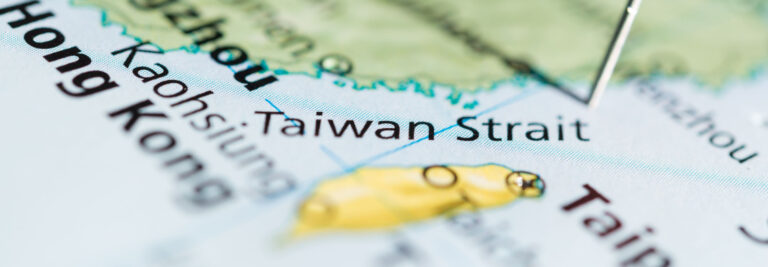Should the United States establish formal diplomatic relations with Taiwan? The question received renewed attention in early April when Benny Johnson, chief creative officer for Turning Point USA—a non-profit organization that seeks “to identify, educate, train, and organize students to promote the principles of freedom, free markets, and limited government”—argued via tweet that the United States should “immediately recognize Taiwan,” among other actions, “after China Virus dies.” Donald Trump, Jr., the president’s eldest son, shared the tweet on Facebook with a comment: “I agree. Who is with me?” The post has been liked more than 68,000 times. A month later, The National Interest and Foreign Policy published pieces on back-to-back days urging the United States to “recognize Taiwan,” providing two alternative, though related, cases for doing so. This is a topic deserving of serious consideration. A more normal relationship between the United States and Taiwan is merited—as is, arguably, ultimate normalization of ties—but these calls for immediate and unqualified action fall short in making the case effectively.
Failing to Make the Case
Writing for The National Interest, Azeem Ibrahim, program director for displacement and migration at the Center for Global Policy, bases his call for recognition on Taiwan and China’s comparative performances in handling COVID-19. Unfortunately, miscues in analysis undermine his conclusion.
His first mistake is to describe Taiwan’s government as “pro-independence.” It is decidedly not. President Tsai Ing-wen’s (蔡英文) position is that Taiwan already exists as a free and independent state formally known as the Republic of China (ROC). This is, in fact, a status quo position, and as president she has been clear that she wishes to maintain the cross-Strait status quo. Specifically, President Tsai wants to maintain communication mechanisms with Beijing, she wants to continue to abide by previous cross-Strait agreements, she has pledged to continue upholding the ROC constitution (in which the national boundaries of the state are defined in accordance with “one China”), and she has not taken steps to pursue a fundamental change in Taiwan’s relationship with the People’s Republic of China (PRC).
Ibrahim’s second mistake is in getting the history wrong: “If we had acknowledged the fact [that Taiwan is an independent country], if Taiwan had already been accepted as a normal independent member of the UN system and of the WHO as it fully deserves to be, their warnings would have been heard, and the course of this pandemic could have been very different indeed.” The author here is presumably referring to Washington’s failure to successfully pursue a “two Chinas” or “one China, two governments” approach during the 1970s and to ensure Taipei maintained a seat in the United Nations. This of course fails to take into account the ROC’s own decisions during that time—when it rejected the possibility of dual recognition and of dual seats in the United Nations. In a related matter, Chris Horton, a freelance journalist in Taipei, tells an illuminating tale:
In 1981, Chiang Ching-kuo’s (蔣經國) government rejected the International Olympic Committee’s suggestion of competing in the Olympics under the name Taiwan, insisting on a name with a connection to China, settling on the one that Taiwanese athletes still compete under today: Chinese Taipei.
This is not ancient history. The Kuomintang—the party of Chiang Kai-shek (蔣介石) and Chiang Ching-kuo—is alive and well in Taiwan. The party has changed along with Taiwan, but its complex legacy continues to shape its policies today, as well as debates in Taiwanese society at large. It is not possible to grapple with the question of diplomatic recognition if we do not grapple with how we got here. The history should perhaps have led to a more cautious conclusion. Ibrahim’s, however, is bold:
Of course, Beijing will lash against anyone who asks for, or recognizes Taiwanese independence. But the United States is not (yet) constrained by any threat of Chinese backlash. As recognition of our mistakes, as correction for past errors, and in gratitude for showing the world the best way on how to handle such a pandemic, the United States should now, at long last, formally acknowledge Taiwanese reality: the United States should unilaterally recognize Taiwan as an independent country.
There are two significant, interrelated issues here. First, the author does not consider that the primary target of “Chinese backlash” would likely be Taiwan, not the United States. Given how infuriating Beijing would find the formal establishment of diplomatic relations between Taiwan and the United States and given Beijing’s obvious interest in proving Washington to be a paper tiger, it might well substantially up the pressure on Taipei, potentially including the use of force. Taipei and Washington could each decide that is a risk worth taking, but it is doubtful they would simply dismiss it, as Ibrahim does here.
On that note, and secondly, Ibrahim does not seem to consider the people of Taiwan’s diverse preferences. It is questionable whether the Tsai government would even want the United States to immediately “recognize Taiwan as an independent country,” whatever that would entail. It may be interested in formal diplomatic relations, but there are risks involved in pursuing such a course, as noted. Indeed, the United States could not act “unilaterally” even if it wanted to do so—the establishment of diplomatic relations takes two. An argument for formal recognition that does not take account of Taiwan’s own interests is not an argument that can be taken seriously.
Did the United States make mistakes in its pursuit of normalization with the PRC? Almost certainly. Was the decision to break diplomatic ties with Taipei a betrayal? It is difficult to describe it any other way. Are Taiwan’s current circumstances unjust? Most definitely. Is there an easy fix? Probably not.
Risk a Crisis to Avoid One?
A journalist based in Taiwan, Hilton Yip, likewise argued for Foreign Policy that the time may be ripe for the United States to “recognize Taiwan.” Like Ibrahim, Yip appears to give little thought to Taiwan’s own preferences, seemingly assuming that if given the opportunity to establish formal ties with Washington, Taipei would jump at the chance. Maybe—but maybe not.
The first two reasons Yip offers for now being the right time could just as well militate against extending diplomatic recognition. China’s handling of COVID-19, its “wolf warrior” diplomacy, and its treatment of Africans in Guangzhou have all brought China to a point at which its “relations with the international community are at a very low point.” Yip’s argument appears to be that because China has seen its international standing fall, other countries will see little reason to continue minding Chinese sensitivities.
Yip may be right, but that does not mean Beijing would refrain from lashing out in response to perceived slights. A weakened China is arguably a more dangerous China. Beijing might perceive Taiwan’s expanding diplomatic relationships—especially with the United States—at this particular moment as especially threatening to its national security interests. On this point, caution, rather than opportunism, should be in order.
The author’s second reason for formal recognition now is that China’s military threat to Taiwan is growing:
Even if Taiwan’s international status remains unchanged, there is a strong likelihood that China will initiate a conflict against Taiwan in the near future. This thus removes the main reason for not recognizing Taiwan as a country, which is to avoid provoking China and maintain peace. In fact, recognizing Taiwan’s nationhood might even act as a deterrent by making it clear the United States and the international community see Taiwan as an actual country and not part of China.
The threat is real—but it is not at all clear that diplomatic recognition right now is the best way to mitigate it. Indeed, as noted earlier, diplomatic recognition could precipitate conflict, perhaps by convincing China it is running out of time to achieve unification.
Diplomatic Ties and Objective Reality
The weaknesses of the Ibrahim and Yip arguments do not undermine the case for a more normal relationship between the United States and Taiwan and for the United States to take action now to ensure continuing peace in Asia. But rather than establishing diplomatic relations at this point, a better way to enhance deterrence against China’s increasing aggressiveness, at least in the near term, would be for the United States to do away with strategic ambiguity, as I argued in the previous Global Taiwan Brief and as Representative Mike Gallagher contended in National Review last week. “Now is the time,” he wrote, “for a declaratory statement of policy committing the United States to the defense of Taiwan.” Clarifying the US commitment to Taiwan’s defense without fundamentally altering the nature of the US-Taiwan relationship has a potentially higher payoff with lower risk.
Is there a compelling case for the United States and Taiwan to establish formal diplomatic relations? Yes. Put simply, current US policy does not comport with objective reality. “The objective reality,” as Mark Stokes, executive director of the Project 2049 Institute, has described it, “is that Taiwan, under its current ROC constitutional framework, exists as an independent, sovereign state.”
When policy and objective reality are unaligned, outcomes are detrimental to US interests—in this case, for example, Taiwan’s exclusion from the World Health Organization, the lack of direct communication between US and ROC presidents, and the potentially difficult task, should it be necessary, of convincing the American people to shed blood and treasure in defense of a country with whom Washington does not share diplomatic ties.
In order to work towards the eventual establishment of such ties, however, a proper appreciation for the interests and preferences of all involved parties is required. Acting precipitously is likely to be in no one’s interest. The point is not that Beijing should have a veto, but that its potential responses must be understood and that risks should be carefully weighed. And of course, Taiwan does get a veto. Any argument for recognition that fails to grapple with that fact is, like the US “One-China” policy as currently practiced, also out of sync with objective reality.
The main point: Any discussion of establishing US-Taiwan diplomatic relations must grapple with Taiwan’s own preferences and China’s potential responses.




